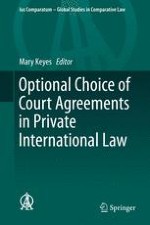2020 | OriginalPaper | Chapter
Optional Choice of Court Agreements: German National Report
Author : Matthias Weller
Published in: Optional Choice of Court Agreements in Private International Law
Publisher: Springer International Publishing
Activate our intelligent search to find suitable subject content or patents.
Select sections of text to find matching patents with Artificial Intelligence. powered by
Select sections of text to find additional relevant content using AI-assisted search. powered by
